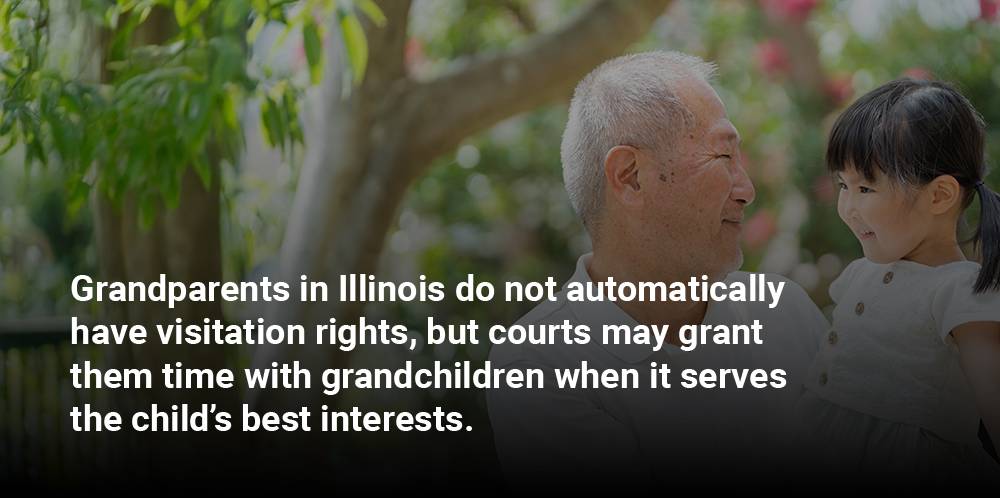Do Grandparents Have Rights to Visitation with Their Grandchildren in Illinois?
 For many families, the relationship between grandparents and their grandchildren means everything. When parents have a hard time getting along, their children may spend more time with grandparents and rely on them for support.
For many families, the relationship between grandparents and their grandchildren means everything. When parents have a hard time getting along, their children may spend more time with grandparents and rely on them for support.
In some situations, the dynamics of a family can deteriorate to the point where the child is no longer allowed to maintain that relationship with his or her grandparent. In Illinois, parents have automatic legal rights to spend time with their children. Grandparents do not have the same rights, but Illinois laws do give grandparents the ability to ask the court for visitation time in certain situations.
If you are a grandparent in Illinois who has not been able to see your grandchild because of conflict with the parents, call a Kane County, IL grandparents’ custody rights lawyer.
Can I Ask the Court for Visitation with My Grandchild?
Under Illinois law (750 ILCS 5/602.9), grandparents do not automatically have the same rights as parents when it comes to visitation with their grandchildren. However, Illinois does allow grandparents to ask the court for visitation in certain situations. These requests are heard in cases where not allowing the child to see the grandparents could harm the child's well-being.
Illinois law presumes that parents will act in the best interests of their children, which includes deciding who can see them. So if a parent will not let a grandparent see a child, the court will assume that the parent's decision is based on a valid concern for the child's best interests. As a grandparent, it is up to you to show that denying visitation is causing harm to your grandchild in some way.
To file for visitation, certain conditions must be met. These include:
-
The child’s other parent is dead or has been missing for 90 days or more.
-
One parent has been deemed unfit or incompetent by a court.
-
One parent has been incarcerated for 90 days or more.
-
The child’s parents are divorced, and one parent has no objections to your visitation.
-
The child’s parents were never married, they are not living together, and one of the parents is your child.
Not all of these conditions have to be met. One is enough.
What Does the Court Look at When Deciding about Grandparents’ Visitation Rights?
Once you have filed your petition for visitation, the court will evaluate your case based on several important factors. While judges start from the assumption that the parents’ decisions about visitation are in the child’s best interests, judges will use the following factors to decide if grandparent visitation would be a good idea:
-
The wishes of the child (if the child is old enough to explain what they want and why)
-
The physical and mental health of the child
-
Your physical and mental health as a grandparent
-
The length and quality of your relationship with the child
-
Your reasons for asking for visitation
-
The reasons the parent(s) are saying no to visitation
-
How much visitation you are asking for and the effect it may have on the child’s daily life
-
Evidence showing that denying the relationship between you and your grandchild is causing emotional, physical, or mental harm to the child
-
Whether visitation can be arranged in a way that minimizes conflict between you and the objecting parent
The judge will consider each of these factors carefully. A judge will also think about how giving a grandparent visitation could negatively affect the child’s relationship with the parent who does not want visitation to happen.
If the judge believes that maintaining or re-establishing a relationship with the grandparent would benefit the child, they may grant visitation rights.
FAQs About Grandparents’ Visitation Rights in Illinois
Can I request custody of my grandchildren in Illinois?
Yes, in certain situations, grandparents may seek custody of their grandchildren. Custody is different from visitation. Visitation means spending time with a child, but not making important decisions for the child. Custody, on the other hand, means making important decisions about a child’s health, school, religious affiliation, and more.
Illinois law allows grandparents to request custody if a court decides parents are unfit, if one parent is dead, or if the child has been living with the grandparent. Custody cases for grandparents are complex. Work with an attorney to understand your specific rights and options.
What is the process for grandparents to request visitation?
The first step is to file a petition for visitation with the court. In your petition, you will need to explain why you think visitation is in the best interest of your grandchild. You have to show evidence that the child would be harmed without visitation. The court will then review your case and determine whether visitation is a good idea based on the best interests of the child.
What if one of the parents objects to my visitation?
The court will consider the reasons behind the objection. While parents generally have the right to decide who has access to their children, if you can show that denying visitation harms the child’s well-being, the court may still grant you visitation rights.
How can I prove that denying me visitation is harming my grandchild?
Different grandparents use different evidence. What you will use will depend on the specifics of your case. In past cases, grandparents have shown proof of having a strong relationship with the child using pictures, letters, and other evidence. Grandparents have also used evidence that suggests the child is struggling because of the distance with the grandparent. A lawyer can help you decide what evidence is necessary and present it to the court.
Can grandparents get visitation if the parents are divorced?
Yes, grandparents can request visitation if the parents are divorced. If one parent agrees to the visitation, the court is more likely to grant the request. However, the court will still consider the best interests of the child before making a decision.

Call a St. Charles, IL Grandparent Custody Lawyer for Help
If you are a grandparent looking to get visitation rights, the stakes can feel very high. In situations where parents are refusing to allow visitation, it is very important to work with an experienced family law attorney who can advocate on your behalf.
At Goostree Law Group, we understand the pain and frustration that grandparents feel when they suddenly cannot see their grandchildren. Our team of compassionate Kane County family law attorneys has experience fighting for grandparents’ rights. We will work closely with you to ensure that your voice is heard in court and that you have the best chance of spending time with your grandchild. Call us today at 630-584-4800.












